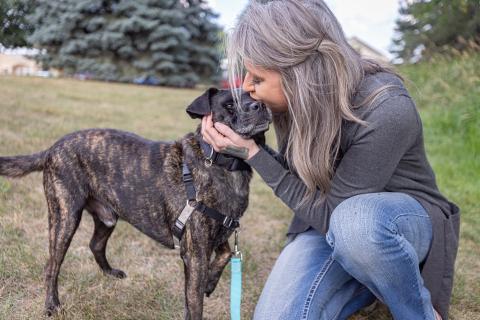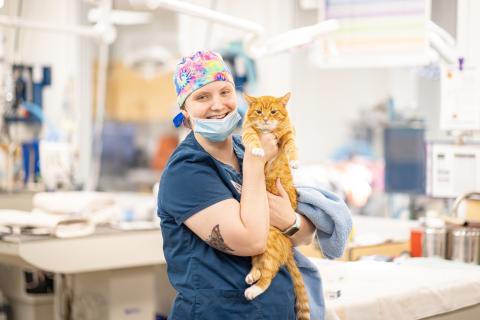While the shelter is a hopeful place full of second chances, it’s also a uniquely stressful and busy place for some of the animals that come into our care. The shelter is full of lots of new sounds, smells, and activity, and all of these things can become overwhelming or overstimulating for our furry friends.
We talked with Liv Hagen, Shelter Behavior & Humane Investigations Manager at Animal Humane Society, about why it’s important to mitigate shelter stress and how AHS helps to minimize stress for the animals in our care.
How stress affects animals in the shelter
“Animals are quite resilient and adaptable, so many animals that come through the shelter can adjust and go with the flow,” Liv says. “However, some animals may react very fearfully and become shy or shut down, while other animals may become overly exuberant and energetic.”
The way an animal reacts to these different variables is referred to as "shelter stress." Because of this stress, an animal's true personality may not come through while they're in the shelter. Animals may display behaviors in shelter that are never seen in the home environment, or vice versa.
While you may see a jumpy, mouthy, or barky dog in-shelter, for example, this same pup could be a calm, quiet dog once they get comfortable in their new home environment. Likewise, a seemingly shy, reserved animal who avoids coming to the cage door may prove to be a boisterous, goofy, affectionate animal in a home.
Stress also suppresses immune function and can make animals more susceptible to illnesses like kennel cough and upper respiratory infection. It can also affect an animal’s ability to heal after medical procedures or surgery, both in their body’s response to healing and in managing activity levels.
Due to these many factors, the compassionate team at AHS try to make shelter life as stress-free as possible to limit the impact of potential shelter stress on the animal, as well as make it easier for potential adopters to decide who would be a great fit for their family.
Four key ways that AHS helps to mitigate stress for animals in the shelter
1. Limiting stress from the very beginning
Mitigating stress starts right at intake. AHS staff use low-stress handling techniques for animals coming into the shelter by using tasty treats and calm, gentle handling for their initial exams.
For those that are too uncomfortable on their first day for this type of close handling, we provide a few days to decompress and adjust before attempting their exam. Cats especially often need extra time and quiet space – such as housing in an office – to acclimate to the shelter environment.
2. Enrichment activities and stimulation
Enrichment is also very important for both mental stimulation and physical exercise. We choose toys and activities that promote natural behaviors appropriate to each species – such as sniffing, chewing, stretching, grooming, climbing, walking, and running. We also use scents, essential oils, and pheromones that promote relaxation and calm behavior.
Spending time on walks and getting attention from staff, volunteers, and customers is also critical for the social and emotional well-being of the animals in our care.
Fostering at AHS
For situations where an animal needs additional support to recover from a medical procedure or the shelter proves to be too overwhelming for an animal, foster volunteers at AHS step in to provide the safe, comforting home environment that the animal needs to thrive.
AHS is currently accepting applications for large dog fosters! Apply today to help make a difference for animals in need.
3. Specialized behavioral care
Our specially trained canine and feline behavior volunteers provide specialized behavioral care alongside our Shelter Behavior Services team for animals experiencing higher stress levels.
Through behavior modification and positive handling that provides choice and control for the animal during interactions, animals become less fearful and are better able to acclimate to the shelter.
This can be particularly important for animals that are at AHS for a longer length of time for medical reasons. Medical handling, like administering medication, treating injuries, or monitoring vitals, can sometimes be frightening and invasive for animals, and our volunteers provide opportunities for positive handling. This helps the animals feel more comfortable, so they remain cooperative and engaged in their care.
For animals that need additional help with coping, AHS vet staff can also prescribe anxiety medications and supplements in conjunction with behavior care.
4. Designated quiet time
Though interaction and attention are important, it’s also important to provide periods of quiet time. During these times, which are usually about one hour each day, the lights are turned off and staff and volunteers stay out of the wards to give the animals time to rest and relax.
Animals in shelter rest far less than animals in the home environment, and rest is critical for mental, emotional, and physical decompression and wellbeing.
AHS is dedicated to giving animals their second chance
“While an animal’s shelter stay is temporary, every experience an animal has is a learning experience that can affect them for the rest of their lives,” Liv says. “We want to keep pets happy and healthy – physically, mentally and emotionally – not only for their wellbeing while they are staying with us, but also to help ease their transition into a new home.”
A low-stress experience in shelter helps set the animal up for success in the future, and makes the adoption experience smoother for their future family. The best place for an animal is the home environment, so AHS aims to get animals into a home as quickly and safely as possible.
Ready to provide a loving home to one of our shelter animals?
If you’d like to adopt one of the many adorable animals currently waiting in our shelters and be a part of their second chance, view our current adoption listings.



